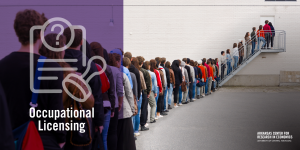By Caleb Taylor
Two ACRE economic experts shared their research on occupational licensing legislation last week.
House Bill 1465 would have mandated that a licensing entity consider the “good moral character” of an individual before granting an occupational license.
“Good moral character” is defined in the bill as a personal history of honesty, trustworthiness, fairness, a good reputation for fair dealings, and respect for the rights of others and for state and federal laws.
ACRE Economic Policy Analyst Alex Kanode spoke about the economic research on occupational licensing at a House Public Health, Welfare and Safety Committee meeting on Thursday, March 4th. (debate begins at 3:42:29 P.M.)
Act 990 of 2019 has no “good moral character” provision. It clarifies relevant background checks for occupational licensing, allowing boards to consider occupational relevance when conducting background checks, and exclude only candidates whose past misconduct is relevant to the occupation they’re trying to enter, according to Kanode.
Kanode said:
Putting moral character back in the code won’t be helpful for Arkansans. It’s a general term applied to all boards and licenses. It doesn’t protect anyone.”
The bill passed the House committee and the full House on Tuesday, March 9th.
However, the bill failed to make it out of the Senate Public Health, Welfare and Safety Committee on Wednesday, March 10th after ACRE Scholar and UCA Associate Professor of Economics Dr. Thomas Snyder discussed his occupational licensing research with the committee. (Snyder’s testimony begins at 5:22:32 P.M.)
Snyder said:
It sounds like something that’s well intentioned, but it does have unintended consequences. It’s a subjective thing. Even if you define (good moral character) with honesty or dishonesty, that’s still subjective. Whenever you have more licensing requirements, you see more people out of the workforce.”
Arkansas already has the 3rd-most burdensome licensing requirements in the U.S. according to the Institute for Justice’s License to Work II report. Arkansas also has the 3rd-highest recidivism rate (reoffense rate) in the U.S., according to a comparison report by Virginia’s Department of Corrections. Research by the United States Sentencing Commission shows that unemployed ex-prisoners have a much higher probability of re-arrest than those employed. And a study by Stephen Slivinski from Arizona State University found that states with high licensing burdens had higher recidivism rates.
Evidence in a study by Snyder and Saliou Ouattara in the Journal of Regional Analysis and Policy suggests that strict occupational licensing burdens lead to more property crime.
You can find out more about our research on labor market regulation here.

